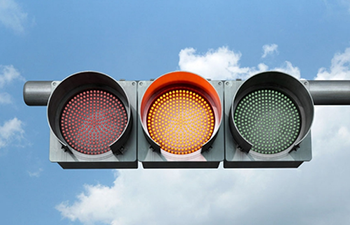
Red means "stop," green means"go," and yellow means "hurry up and make that damn light."Why those colors, though? Why not blue, purple, and brown? I have to admit thataside from a hunch that it had to do with wavelengths, I had no idea myself, soI decided to look into it.
红灯停,绿灯行,黄灯亮了快点走,但为什么交通信号灯要用这三个颜色,而不用蓝色、紫色或者褐色呢?必须承认除了直觉认为这与波长有关外,我完全不知道原因,所以我决定一探究竟。
The answer, as it turns out, is a littleconvoluted, but makes sense.
事实证明,答案确实有点复杂,不过倒也还讲得通。
The earliest traffic signals were designedfor trains, not cars.
最早的交通信号灯是为火车而不是汽车通行设计。
They were red and green, gas-powered, andmore than a little dangerous in the event of a leak.
信号灯为红色和绿色,使用煤气,在漏油时会非常危险。
•Red is an inherited symbol from railroads
红色源于铁路信号灯
Red symbolizes danger in many cultures,which makes sense, considering it has the longest wavelength of any color onthe visible spectrum, meaning you can see it from a greater distance than othercolors.
由于红色在可见光谱中波长最长,因此可视距离要比其它颜色更远,这就可以理解为什么很多文化中将红色视为危险信号。
Red has meant stop since long before carsexisted, with train signals' use of red dating back to the days when mechanicalarms lifted and lowered to indicate whether the rail ahead was clear.
红色很早以前就被用作火车信号,那时汽车还没出现,而铁路用机械臂板上升下降来代表前方是否有火车驶来。
So that one's simple.
这比较容易理解。
•Green meant "caution" at first
绿色最早用于警示
Green's role in lights has actually changeddramatically over time.
长期以来绿色在交通信号灯中的角色发生了巨大变化。
Its wavelength is next to (and shorterthan) yellow's on the visible spectrum, meaning it's still easier to see thanany color other than red and yellow.
可见光谱中,绿色波长因仅次于黄色,因此是除了红色和黄色外最容易看见的颜色。
Back in the early days of railway lights,green originally meant "caution," while the "all-clear"light was, well, clear or white.
在早期的铁路信号灯中,绿色最初代表警示,而无色或白色代表全线通行。
Trains, of course, take an interminablylong time to stop, and legend has it that several disastrous collisionshappened after an engineer mistook stars in the night horizon for an all-clear.
当然,火车停下来需要非常长的时间,据说由于一名工程师将夜晚天空中的星星误认为全线通行的信号灯,导致了若干起灾难性事故的发生。
Thus, green became "go," and fora long time, railways used only green and red to signal trains.
因此,绿灯成为了通行的标志,长期以来铁路也只将红色和绿色作为信号灯。
•Yellow means "caution" because it's almost as easy to seeas red
黄色代表注意,因为它几乎和红色一样显眼。
From the earliest days of motoring up untilthe mid-1900s, not all stop signs were red --many were yellow, along with yieldsigns, because at night it was all but impossible to see a red stop sign in apoorly lit area.
从最早开始出现汽车到20世纪中期,并不是所有的停车信号都用红色——很多使用黄色,让路标志也是,因为夜晚在光线极暗的地方根本看不见红色的停车信号。
The yellow stop-sign craze began in Detroitin 1915, a city that five years later installed its first electric trafficsignal, which happened to include the very first amber traffic light, at thecorner of Michigan and Woodward Aves.
黄色停车信号潮始于1915年的底特律,五年后,这座城市在密歇根和伍德沃德大街安装了第一个首次包括黄色灯的电子交通信号灯。
But what of those weird yellow stop signs,you ask? As materials and technologies evolved, the ability to produce highlyreflective signs meant that red could resume its natural spot in the signhierarchy, leaving the still-highly-visible yellow (it's second only to red interms of visible wavelength) to the domain of "caution." That's whyschool zones and buses, crosswalks, and other important warnings are yellowtoday.
你是不是想问,那些奇怪的黄色停止标志又是干什么的呢?材料学和高技术的发展使得人们研发出高度反光指示灯,因此红色才能在信号灯中重拾停车霸权,将可视度较高的黄色(可视波长仅次于红色)留在了警告的位置。这也是为什么学校区、公交站、人行横道和其它重要位置使用黄色警告信号灯的原因。











